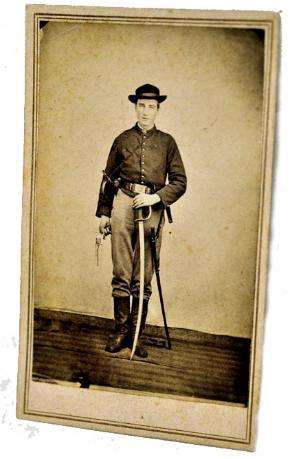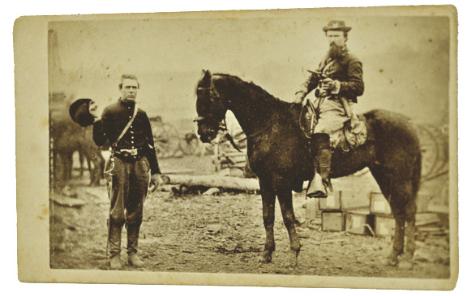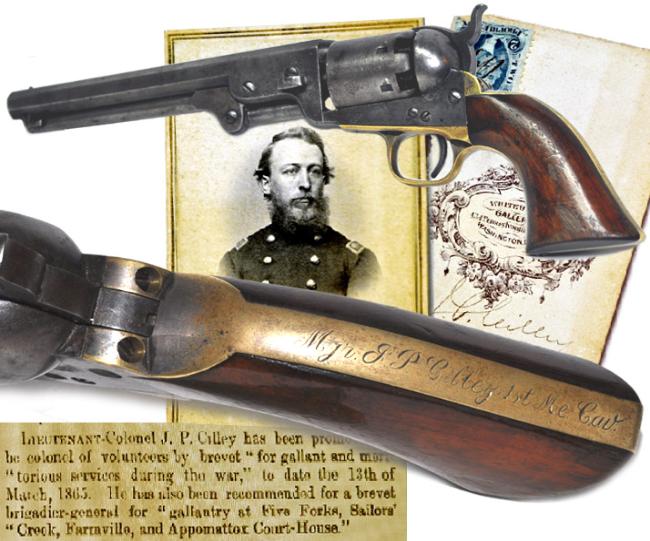


Charles B. Kenney was a 17
year old sailor when he
enlisted at Cape Elizabeth,
Maine. He mustered out as
Regimental Bugler at the close
of the Civil War.

Brothers, Samuel M. & William L. Johnson of Milo, Maine joined the 1st Maine Cavalry Regiment together. Samuel was killed on the field at Sailor’s Creek and William fell severely wounded in the same action. He would die eleven days later at Carver Army Hospital in Washington, D. C.

Inscribed Model 1851 Colt .36 caliber percussion revolver
manufactured in mid 1861.
A working gun carried in the Civil War by Jonathan P. Cilley of Thomaston, Maine. Cilley who rose to the rank of Brevet Brigadier General before the close of the war was credited as the first to volunteer for service in the 1st Maine Cavalry Regiment when he entered as a Captain of Co. B on October 19, 1861. Promoted to Major on April 14, 1862 Cilley would fall from his saddle on May 24, 1862 while leading men in a cavalry charge at Middletown, Virginia. Struck by a Confederate shell the Major was the first of the Regiment to be wounded in battle. In the ensuing confusion Cilley was left on the field for dead. When he regained consciousness days later, Cilley found that he had been carried to a private home where in his words recorded later, he received the motherly care and nursing of a local merchant’s wife. Advised that he was mortally When he regained consciousness days later, Cilley found that he had been carried to a private home where in his words recorded later, he received the motherly care and nursing of a local merchant’s wife. Advised that he was mortally wounded Cilley responded that he intended to see the war finished. In the meantime the word had reached Gov. Washburn back in Maine that that the Major had been mortally wounded and died immediately upon being taken prisoner. Like another Mainer (Gen. Joshua L. Chamberlain) Major Cilley would not only live to read his own obituary but would subsequently return to active service. Cilley would lay under the care of the Virginia housewife for three months before he could be moved to the Union lines at Winchester, Virginia then to Washington. A return to his beloved Maine for recuperation would be followed by more surgery at Armory Square Hospital. He remained under the care of an Army physician till the following April. Though he returned to active duty the wound did not heal until September 1863 requiring several surgical procedures to remove sloughed off bone. Despite his painful wound Cilley gained the command of the hard fought 1st Maine Cavalry Regiment and earned the reputation as a hands on, in the fray leader, most frequently found revolver in hand, exposed and in the lead. Severely wounded yet again on June 24, 1864 at St. Mary’s Church, Virginia, Cilley returned to active duty three months to the day and would serve till the close of hostilities in 1865. Necessarily abbreviated here, a more detailed record of General Jonathan P. Cilley’s gallant service may be found in Edward P. Tobie’s History of the First Maine Cavalry 1861 – 1865.






